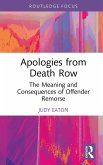This volume consists of up-to-date review articles on topics relevant to psychology and law, and will be of current interest to the field. These topics are currently attracting a great deal of research and public policy attention in the U.S. and elsewhere and will be relevant to researchers, clinical practitioners, and policy makers. Topics include: attitudes toward police (Cole et al.), accuracy of memory for child sexual abuse (Goldfarb et al.), the use of interpreters in investigations (Goodman-Delahunty et al.), adjustment of former prisoners post-exoneration (Kirshenbaum et al.), psychological implications for gun policy (Pirelli et al.), ability to match people with images from ID cards and video (Rumschik et al.), judicial instructions on eyewitness evidence (Skalon et al.), social science of the death penalty (West et al.), and informant testimony (Wetmore et al.).
- Comprehensive reviews of a broad range of topics of interest to the law-psychology community;
- Contributors are highly productive and well-known researchers;
- Each chapter contains recommendations for future research, which will help frame work for years to come.
Dieser Download kann aus rechtlichen Gründen nur mit Rechnungsadresse in A, B, BG, CY, CZ, D, DK, EW, E, FIN, F, GR, HR, H, IRL, I, LT, L, LR, M, NL, PL, P, R, S, SLO, SK ausgeliefert werden.









